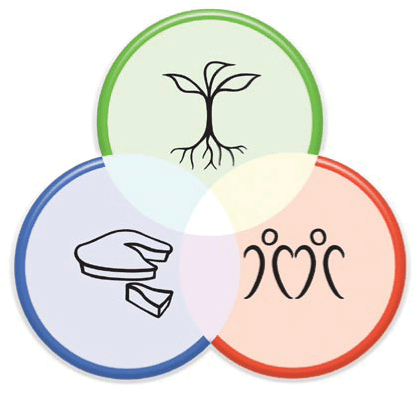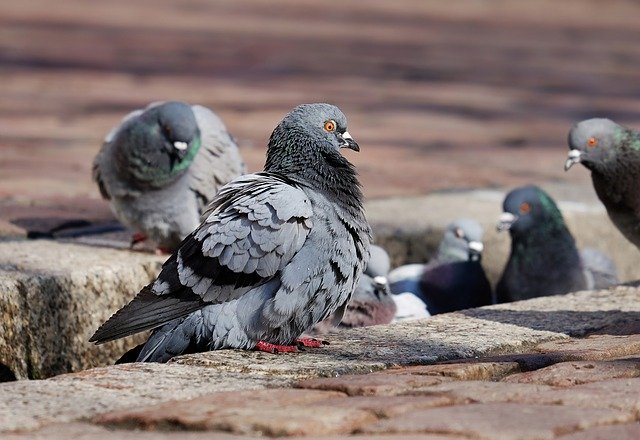I have been learning about permaculture. Say, “What?” I am a organisation and product design coach that lives in a big city. If I am lucky I see one tree per day and some pigeons. Why would I learn about permaculture?
Why? Because I live in an ecosystem! And businesses are ecosystems as well.
Permaculture is a philosophical and design approach to cultivating ecosystems.
It is inspired by natural systems (biomimicry). Thank you billions of years of R&D! Permaculture can be applied to all spheres, including, the garden, workplace and personal life. Best of all, personally, permaculture reconnects us with our true roots (because everyone has to eat!) Our reliance and being part of nature is inescapable. So, we may as well learn from and promote it. This article is a little taster to get your appetite going.
The guiding ethics of Permaculture and how it applies to you
First a little history: Permaculture was inspired by a Japanese agriculturist Masanobu Fukuoka and formalized in the 1970s by two Australiens: Bill Mollison, a biologist, and David Holmgren, a writer.
Permaculture is a systemic approach with three core ethical tenants (in order of importance). How can we apply them and what are some questions to reflect on? Please leave a comment with more ideas!

1. Care of the Soil (Earth Care):
Care for the soil and in turn it cares for us. This means ensuring that we replenish what we take and nourish our environments. Soil is the best indicator of the health and resilience of the culture. Where there is soil erosion often then is cultural erosion or instability.
- In the garden: We must tend to the soil to ensure its health is never diminished and only enriched from our growing practices. There are many tactics for this and it depends on your specific environment. Permaculture always starts first with observation and then small tests in increments.
- At work: What is the work environment like and company culture? Does it promote growth, autonomy and stewardship? Does the daily work diminish your energies or feed it? Much like soil becomes weak from growing only one type of plant: Are we promoting diversity of thought and actors in our business? Observe, collaborate and test in small steps ways to enrich your environment.
- At home: Is our home environment peaceful, supportive and nourishing? It is your base to grow from, so ensure you have the “nutrients” you need there. Focus on this first before expanding to projects that draw from “soil” strength.
- For the environment: Caring for the soil can be as simple as buying organic whenever possible. As we are helping ensure that what we eat does not strip the soil. Another idea is voting for laws that protect our ecosystems and expand the access to organic and ethical goods, especially for those with less means.
2. Care of people (People Share):
We must ensure base needs are met of everyone including ourselves to then be able to contribute back to the system. Meeting needs, does not mean just monetarily…
- In the garden: Growing the plants sufficient to feed us and have a diverse nutrient diet (or cooperating will fellow gardens who compliment our soil). We then can reinvest that energy back into our garden.
- At work: Are our employees being cared for in a way that their growth is supported? This includes both the income and support systems, such as healthcare, necessary to meet their basic needs and learning opportunities. Ourselves, as managers, coworkers, leaders… are we “feeding” ourselves intellectually? Are our providers being taken care of? And local ecosystems and municipalities that our business operates in… how are they doing? Look at the complete business cycle: resource extraction, production, distribution, product use and eventual product disposal. Everyone’s needs must be met to later best collaborate and innovate together in the long term.
- At home: Does each person have the space/time to cultivate and fulfill their basic needs? Do not forget yourself! How are we “feeding” our home both literally and metaphorically? This ethical tenant calls for expanding beyond monetary or even nutritional well-being to include other measures of happiness, non material based. It begs the question, for those with the margin, perhaps it is not best to work more to earn nonessential money for goods, but instead stay home and cultivate our family ties and personal growth.
- For the environment: “Feed” ourselves and communities well so that we may then have the energy for others including fighting for the environment. Social issues are environmental issues! So, as mentioned above, civil action and volunteerism where possible is a complementary action with this ethic. This ethic also encourages stopping “mindless consumption” which is not sustainable for the environment nor a true contributor to our happiness.
3. Take what we need and share the rest (Fair Share):
This is a tricky one, but as you delve in it makes pragmatic sense. This is to ensure we have balanced consumption within the bounds of our ecosystem and redistribute to ensure the whole ecosystem is fed. This is seen as liberty within boundaries. If we ensure we do not overtake, that means we can still play within realistic boundaries meeting our individual desires vs. overusing and then being forced into austerity, losing our liberty. This ethical tenant encourages that this stays on a personal decision level, and we each cultivate our own balance and act as a model (and proof that it works!) for others.
- In the garden: Creating the size of garden that is sustainable. Sharing your crop with neighbors and community.
- At work: Feed your company but do not monopolize and root out competition. Competition is healthy for promoting innovation and collective learning via multiple lines of “attack”. Better yet collaborate and cooperate with competition! Darwin’s discussion of “survival of the fittest” is misremembered (and even misquoted) as focusing on only competition but evolution has shown that actually cooperation is one of the biggest keys to survival. In addition, this tenant gives a big vote for open source and circulation of information. It is like expanding the brain of our business to include more synapses for the benefit of all.
- At home: Do not monopolize the whole household’s resources. Take what you need and ensure space for others. As a household share your excess with neighbors and others. Cooperation will be there for you always, including your own times of need.
- For the environment: Avoid food waste at home. Buy only what we need and use it all. And if you have extra, give or resell (in the case of goods) the rest to others. This will reduce their need to take from and potentially tax the system. This mindset moves us towards meeting the needs of our population without over-farming and eventually moving to austere methods or climatic disaster.

Want to learn more?
This is just the start! There are 12 principles and so much to learn from permaculture and natural systems and their design.
If you speak English:
- Holmgren, one of the originators: https://holmgren.com.au/
- Website by above creator solely on the core principles:
https://permacultureprinciples.com/ - Ferme du Bec, a French innovator in this field (even has an English online course): https://www.fermedubec.com/english/
If you speak French :
- Check out my buddy’s website, https://www.permagile.org/. Nathaniel has lived experienced applying permaculture to business and was the first one to inspire me to learn about it.
- Currently there is an online course by Colibris. Not too late to sign up. Even afterwards the material will be available: https://colibris-universite.org/mooc-permaculture/?I11Bienvenue
